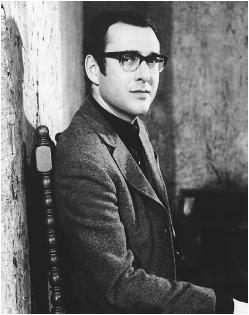

Haunting the Web Since 1999
As discovered while tracking down the first three Coraline posters above: In an intriguing meeting of the minds, it seems Peter Jackson has locked down the very talented Brian Eno to score The Lovely Bones for him.
For a possible taste of things to come, you really can’t go wrong with “By this River” (or anything off of 1977’s Before and After Science, for that matter) or “And Then So Clear,” from 2005’s Another Day on Earth.) As these two songs suggest, Eno will no doubt come up with something appropriately ethereal, evocative, otherworldly, and beautiful for Jackson’s long-awaited adaptation.

Thus was the freewheelin’ Bob Dylan’s happy reaction to Obama’s election Tuesday night. (As you may remember, he publicly backed the senator in June.) For many others, including yours truly, the feeling of the evening might best be summed up by one of Dylan’s esteemed contemporaries, Leonard Cohen: “Hallelujah, Hallelujah, Hallelujah, Halleloooooojah!“
For the first time since 1994, we have a Democratic president and a safely Democratic Congress. For the first time since 1964, we have a Democratic president entering office with a commanding mandate from the people. For the first time since…well, ever, we’ve reaffirmed our founding principles by choosing an African-American to lead us into the future.
I don’t want to overplay the “first black president” thing, because that’s not at all why we chose Sen. Obama. Still it must be said: With this election, we have shown the world — and ourselves — anew that the American ideal isn’t just a convenient myth, but a vision of the good that many of us still aspire to create every day. In the words of Cornel West, “To understand your country, you must love it. To love it, you must, in a sense, accept it. To accept it as how it is, however is to betray it. To accept your country without betraying it, you must love it for that in it which shows what it might become. America – this monument to the genius of ordinary men and women, this place where hope becomes capacity, this long, halting turn of the no into the yes, needs citizens who love it enough to reimagine and remake it.” And so we have, in a way the founders of our American experiment 221 years ago could barely have imagined.
Meanwhile, even with crooks like Ted Stevens and Norm Coleman still floating for the moment, our old friends the Republicans are now not only in full rout, but appear to be set to tear each other’s throats out in assigning blame for their repudiation at the polls. (Expect several further symposia of conservative hand-wringing, and a lot more intraparty shivving, along the lines of “Palin thinks Africa is a country,” in the weeks to come.) This gang will regroup — they always do — but for now the GOP has enough problems of their own to keep them busy. And, whatever ever they manage to accomplish as the loyal(?) opposition, it seems a safe bet that the Conservative Era that began with the defeat of Barry Goldwater in 1964 has now officially coughed up its last in 2008, with the defeat of fellow Arizonan John McCain.
By the way, also joining the Republicans on the road to oblivion Tuesday night, alas, was my old laptop, a victim of post-return celebratory spillage. (Jamesons: Good for Jimmy McNulty and jubliant Dems, Bad for computer hardware in and around the television area.) Normally, inadvertently frying my growing-ancient-but-generally-reliable PC would’ve completely ruined my day. As it was, I took the news about like Baxter eating the whole wheel of cheese: “How’d you do that? Heck, I’m not even mad; that’s amazing.” (And, fortunately, the hard drive, and the dissertoral files therein, were salvageable regardless.)

One much more depressing skeleton at the feast Tuesday night, about which Ted at Gideonse Bible, Chris at DYFL, and others have written eloquently: the passage of the idiotic Proposition 8 in California, which seemingly won with quite a bit of help from first-time Obama voters. It’s irredeemably sad not only that a day that saw so much progress was marred by Prop 8 and its like around the country, but that so many of the voters who helped strike a fatal blow against enduring racial prejudice at the national level seemingly had no qualms about encoding anti-gay bigotry into the California constitution.
Perhaps I’m dense, but I fail to understand how the institution of marriage could somehow be threatened by the state recognizing the unions of same-sex couples, particularly in a day and age when so many straight folk (myself included) have already had marriages that failed. (As my old boss used to say of the thrice-married Bob Barr back when he supported the Defense of Marriage Act: “Which marriage is he defending?”) By the way, particularly galling on the Prop 8 front, I think, is the strong imposition of the Mormon church into the battle on the side of the anti-gay zealots. One would think, of all people, the Mormons might have some sense of the damage that can be wrought by the state involving itself in stringent definitions of marriage. But, no, apparently what was good for two ganders in the eyes of the Mormons isn’t good for the goose. For shame.
Still, the Prop 8 debacle notwithstanding (I have every faith that within a decade, that law will seem as knee-jerk, narrow-minded, and embarrassing as it in fact is), Tuesday was otherwise a great night for America. What it now befalls us to remember is that, while we should savor them while we can, the path of progress before us will likely offer few such moments of jubilation in the months and years ahead. When it comes to change, it really is “uphill all the way.”
Given the economic and diplomatic travails already before President-elect Obama, he’ll have his work cut out for him from jump street. And those out there old enough to remember President Clinton’s first days in office, and how quickly things seemed to go south then (the sanity-restoring ’93 budget bill notwithstanding) will know that a Dem president and Dem Congress is no guarantee of progressive legislation in the offing. We won’t see the change we want — and voted for — without maintaining steady and unyielding pressure on all the machinery of government in the months and years to come. Now is not the time to sit back and let our new president try to do all the heavy lifting, but to stay involved as citizens and keep the progressive ball moving forward. (And, hey, keeping one’s head in the game may help to mitigate those postpartum existential crises The Onion warned us about.)
 In an election held eighty years ago (i.e. in the living memory of one Ann Nixon Cooper), Herbert Hoover, the longstanding Secretary of Commerce widely revered as “the Great Engineer” and “the Great Humanitarian,” decisively defeated Al Smith, the Catholic Governor of New York. “Given a chance to go forward with the policies of the last eight years,” Hoover had promised in his nomination speech, “we shall soon with the help of God be in sight of the day when poverty will be banished from this nation.” And, while he obviously had his detractors, many across the country viewed Hoover as a miracle-worker who could singlehandedly steer the country to these new great heights. “We were in a mood for magic,” journalist Anne O’Hare McCormick wrote of the Hoover inauguration. “We summoned a great engineer to solve our problems for us; now we sat back comfortably and confidently to watch the problems being solved.“
In an election held eighty years ago (i.e. in the living memory of one Ann Nixon Cooper), Herbert Hoover, the longstanding Secretary of Commerce widely revered as “the Great Engineer” and “the Great Humanitarian,” decisively defeated Al Smith, the Catholic Governor of New York. “Given a chance to go forward with the policies of the last eight years,” Hoover had promised in his nomination speech, “we shall soon with the help of God be in sight of the day when poverty will be banished from this nation.” And, while he obviously had his detractors, many across the country viewed Hoover as a miracle-worker who could singlehandedly steer the country to these new great heights. “We were in a mood for magic,” journalist Anne O’Hare McCormick wrote of the Hoover inauguration. “We summoned a great engineer to solve our problems for us; now we sat back comfortably and confidently to watch the problems being solved.“
For his part, Hoover was less sanguine about his prospects. “They have a conviction that I am some sort of superman, he fretted. “If some unprecedented calamity should come upon the nation…I would be sacrificed to the unreasoning disappointment of a people who expected too much.“
Who among us think Hoover a superman now? History doesn’t stop with a war or an election or the collapse of a governing ideology, be it Communism or Conservatism. It grinds inexorably on, always uncertain, always equal parts danger and opportunity, and all too often deeply laced with irony — Time and time again in our American story, nothing succeeds like abject failure, and nothing fails like a great success. So let’s not rest on our laurels by any means: The election of 2008 was a campaign hard-fought and hard-won, but the battle continues, and in many ways the real work before us is only now just beginning.
Let us look to navigate the turbulent waters ahead with a deep and abiding faith in our new captain, but also with our own eyes to the sea.
(Presidents pic via Hal at Blivet and Patrick at Supercres.)
“In my mind I’m barely scratching the surface here, and not because of what my interpretation means or what inspired the actual lyric, but because there are so many possible interpretations and mine doesn’t really that much matter in the long run. So no, I don’t think I’ll regret sharing a few ‘secrets’ with those who really care about the songs.” (I finally talked to Michael Stipe, he touched me on my arm…) In honor of Matthew Perpetua of Fluxblog completing his recent R.E.M. side-project, Pop Songs ’07-08, Stipe drops by to answer your questions about the lyrics. [Part II, Part III.] Great score, Matt, and congrats on finishing up the R.E.M. oeuvre.
Another choice link by way of Web Goddess. Until half an hour ago, I probably would’ve told you my favorite apocalyptic-pop Youtube video was this creepy-weird German mashup set to Johnny Cash’s “The Man Comes Around”. But now it’s probably this ska-happy rendition of Dubya crooning “ITEOTWAWKI (AIFF).” Both are worth watching, if you can get around their innate “not lovely lovely Ludwig Van” eeriness.
“‘He was a hard man and he made no apologies for that,’ Childress said. ‘When it came to me and my mother and my daughter he was the softest.’” Bernie Mac, 1957-2008.
And, if that surprising bit of news wasn’t sad enough, Isaac Hayes, 1942-2008. “They’re standing on our shoulders. Some of them don’t realize [it] because they sample me so much.“
“This is a very unusual theft and I am confident that someone locally will have knowledge about who is responsible or where the memorial stone is at present.” By way of Ted, someone has walked away in silence with Ian Curtis’ tombstone. (Here’s the scene of the crime.)
“In the lower courts, according to a study Professor Long published in the Washington & Lee Law Review last year, Mr. Dylan is by far the most cited songwriter. He has been quoted in 26 opinions. Paul Simon is next, with 8 (12 if you count those attributed to Simon & Garfunkel). Bruce Springsteen has 5.“
With great lawyers, you have discussed lepers and crooks: By way of Ted at the Late Adopter, the NYT examines Chief Justice Roberts’ use of Dylan in court opinions. “Mr. Dylan has only once before been cited as an authority on Article III standing, which concerns who can bring a lawsuit in federal court…The larger objection is that the citation is not true to the original point Mr. Dylan was making, which was about the freedom that having nothing conveys and not about who may sue a phone company.”
“‘Actually, one of my favorites during the political season is “Maggie’s Farm,”‘ Obama said of one of Dylan’s tracks. ‘It speaks to me as I listen to some of the political rhetoric.‘” But does he like the RATM version? While doing the obligatory secrets-of-his-iPod conversation with Rolling Stone — he’s a huge Stevie Wonder fan, which explains “Signed, Sealed, Delivered” on the trail — Sen. Obama sings the praises of Dylan. (Dylan did the same of Obama earlier this month.)
“You should always take the best from the past, leave the worst back there and go forward into the future.” Take that, Sean Wilentz. In an interview with The Times (concerning his touring art show), the freewheelin’ Bob Dylan backs Barack Obama. “Well, you know right now America is in a state of upheaval. Poverty is demoralising. You can’t expect people to have the virtue of purity when they are poor. But we’ve got this guy out there now who is redefining the nature of politics from the ground up…Barack Obama. He’s redefining what a politician is, so we’ll have to see how things play out. Am I hopeful? Yes, I’m hopeful that things might change. Some things are going to have to.”